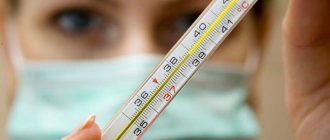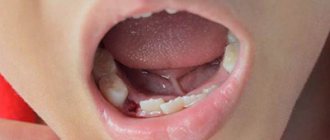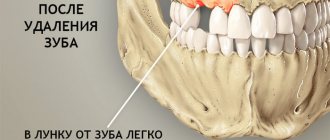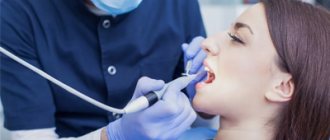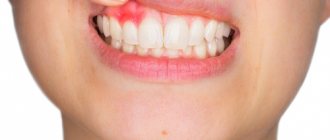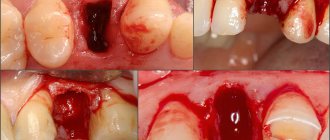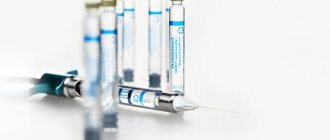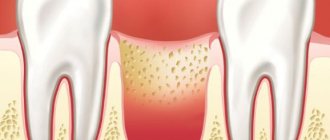05.11.2019
A person can “climb the wall” from pain due to pulpitis, periodontitis, unsuccessfully pulled out teeth and other problems of an inflammatory or traumatic nature. To get rid of an unbearable condition, most people are ready to drink handfuls of any pills. Ketanov for toothache is common among ordinary people as the most effective drug. Let's try to figure out how safe Ketanov is, how to use it most effectively, and in what cases taking the medicine is strictly contraindicated.
The main active ingredient of Ketanov is ketorolac. One tablet contains 10 mg of ketorolac (30 mg in one ampoule). In addition to this active substance, the tablets of the drug contain other necessary components of auxiliary action:
- corn starch;
- cellulose;
- magnesium stearate;
- silica;
- Macrogol 400;
- purified talc and water.
If the patient has to use Ketanov in injections, then the injection form of the drug also includes other chemical components (ethyl alcohol, sodium and disodium compounds, water).
The first hours after removal.
After a tooth has been removed, a hole forms in the patient's mouth, which may bleed. In order to stop the bleeding, the doctor places a gauze pad on the site of the extracted tooth for a period of 15 minutes to half an hour. After removing the tampon, a blood clot forms in the socket, which protects the bone exposed after the operation. You should not try to remove it; over time it will resolve, leaving behind healthy tissue. For the first three to four hours after surgery, be sure to refrain from eating, drinking, and smoking.
WHAT ARE THE ADVANTAGES OF THE DRUG
The main advantages of Ketanov are its following features:
- the ability to relieve severe pain of various origins, when other medications are helpless;
- minimum “side effects” when taken (compared to other painkillers);
- long-term analgesic effect (at least 6-8 hours);
- the possibility of abrupt drug withdrawal and the absence of addiction syndrome (withdrawal) even after a long course of administration (up to 6 months).
BY-EFFECT
Unfortunately, in some people this drug can cause a lot of unpleasant phenomena in the body. The most common of them include:
- dyspeptic symptoms (dry mouth, nausea or vomiting, inflammation of the stomach or exacerbation of ulcers, constipation or diarrhea, stomach pain);
- neurological changes (headache or dizziness, nervousness or excessive drowsiness, hyperesthesia of some parts of the body);
- from the ENT organs (sometimes it reduces hearing or provokes ringing in the ears, and can impair vision);
- therapeutic disorders (high blood pressure, slow heartbeat);
- from the urinary organs - swelling is sometimes possible.
The first day after removal.
Be prepared for the fact that you may feel pain and swelling for the first time after tooth extraction. Therefore, dentists usually prescribe various anti-inflammatory and painkillers to their patients. In case of painful sensations, it is not forbidden to take medications such as
- Novigan;
- ketanov;
- analgin;
- Nurofen;
- ibuprofen, etc.
Just remember to strictly follow the instructions for taking the medications and observe the permissible dosages.
WHEN KETANOV IS CONTRAINDICATED
Despite its high effectiveness, ketans should not be used by people with a number of diseases.
This drug is contraindicated in:
- individual intolerance;
- bronchial and “aspirin” asthma, bronchospasms;
- impaired kidney or liver function;
- congestive decompensated heart failure;
- diseases of the hematopoietic system and bone marrow (including hemophilia);
- serious gastrointestinal problems (exacerbation of ulcerative pathology, cirrhosis, hepatitis);
- in the preoperative period (due to the real risk of bleeding);
- for polyps in the nose or paranasal sinuses;
- in conditions after a stroke.
The use of this medicine is limited to:
- in case of blood clotting disorders, it is necessary to control the level of platelets in the blood (especially after operations);
- use requires caution in case of hypertension, diabetes mellitus, lupus erythematosus, sepsis;
- careful use for people in professions or occupations that require special attention or speed of reactions (including drivers, representatives of dangerous professions, tourists when traveling difficult routes, etc.);
- restriction of use to patients of the older age group (over 65 years).
APPLICATION OF KETANOV IN CHILDREN'S PRACTICE, PREGNANT AND NURSING WOMEN
During pregnancy or lactation, as well as during childbirth, the drug is contraindicated for use. Ketanov should not be given to children for toothache. It is used only for adults (patients over 16 years of age). In exceptional cases, the medicine can be used to relieve severe pain in children from 2 years of age.
INTERACTION WITH OTHER SUBSTANCES
With the simultaneous use of ketanov and certain drugs, toxic effects on the body and increased side effects are possible.
Such drugs include anticoagulants (aspirin, heparin, etc.), lithium drugs, and other drugs with a similar effect.
The combination of Ketanov with other drugs requires consultation with a doctor. It is prohibited to use Ketanov with any type of alcohol. “Ketanov + alcohol” will deal a severe blow to your liver.
First week after removal.
The first day after your tooth is removed, doctors advise you to refrain from rinsing. And in the following days, experts recommend not to overdo this procedure, but simply keep the medicine in your mouth for some time. Such baths should be done several times a day using various anti-inflammatory and disinfectants, including
- decoction of oak bark;
- decoction of chamomile or sage;
- miramistin;
- chlorhexidine;
- furacillin solution.
These drugs will help relieve inflammation, pain and swelling, and also have a deodorizing function. Speaking of oral hygiene, in the first days you should brush around the teeth that are located close to the affected area, and also under no circumstances use rinses or other liquids to clean the mouth.
THERAPEUTIC ACTION
Ketanov is a non-steroidal anti-inflammatory drug with systemic effects with a particularly powerful analgesic (pain-relieving) effect.
When administered, it has a triple effect on the body:
- relieves heat and inflammation;
- has an analgesic effect.
However, it is the super-powerful analgesic effect that allows this medicine to be used for unbearable toothache.
DOES KETANOV HELP FOR TOOTH PAIN?
The drug has a very powerful peripheral effect. It is this effect of the medicine that “eclipses” all its other qualities. Ketanov is a non-narcotic analgesic substance with an excellent analgesic effect.
Ketanov helps with toothache much more strongly than other drugs from the same group.
For example:
- butadione – 453 times;
- analgin – 350 times;
- nalgesin – 50 times;
- indomethacin – 5 times.
Obviously, the most powerful peripheral effect of Ketanov compared to other non-steroidal anti-inflammatory drugs. That is why this medicine is a powerful means of relieving various pains, including those caused by traumatic or postoperative conditions.
KETANOV'S WORK IN THE BODY
The medicine inhibits the activity of special enzymes, as a result of which the production of modulators of inflammation, pain and thermoregulation is suspended. The analgesic power of the drug is equal to that of morphine-like substances. On average, the onset of action of the drug is half an hour after intramuscular administration and an hour after using the tablets.
Ketanov does not cause:
- disorders in breathing or nervous system;
- the appearance of vomiting or nausea;
- urinary retention and bowel function;
- increased pressure;
- increased heart rate;
- drug addiction.
Ketanov is able to accumulate in the liver tissue and penetrate into breast milk.
It is excreted through the urine and partially through the intestines.
Necessary manipulations after tooth extraction:
- We apply something cold for the first 2 hours after surgery, from the outside to the removal site, after wrapping it in a paper napkin. If there is no special medical “cold”, then you can use any frozen product from the freezer.
- Exclude hot food for the first day, chew on the opposite side. Eliminate baths, saunas, hot baths and workouts for 5 days!
- Take medications prescribed by your doctor, usually these are 3 oral medications :
- Antibiotic - Amoxiclav 625 mg (1 tablet 2 times a day), or Tsifran-ST 0.5 mg (1 tablet 2 times a day).
This type of medicine is necessary after tooth extraction in order to protect the mucous membrane damaged after extraction from microbial infection.
- Antihistamine - Suprastin, Zodak, Tavegil (optional) - take according to instructions. These types of medications often have side effects such as drowsiness! Please take this into account when accepting.
This type of medication is necessary so that postoperative swelling goes away much faster.
- NSAIDs (non-steroidal anti-inflammatory drugs) for pain - Ketanov, Ketonal-Duo, Nimesil, Nise, etc. Take as directed. It is not recommended to take aspirin! If you have ever had stomach problems (gastritis, gastric ulcer or duodenal ulcer), it is recommended to take nimesil from this list of drugs! If you currently have such diseases, it is recommended to additionally drink omeprazole 20 mg 1 tablet in the morning while you are taking NSAIDs - this will protect your stomach lining from the side effects of NSAIDs.
This type of medication is necessary after tooth extraction to relieve pain and reduce postoperative inflammation.
4. Make oral baths after meals for 5-7 days with a solution of Chlorhexidine 0.05%. Those. take this solution into your mouth, tilt your head to the side where the operation was performed so that the solution flows into the cavity of the wound, hold it for 30 seconds and spit it out.
5. Application of Metrogil Denta ointment to the postoperative hole, suture line 2-3 times a day, for 5 days. There are several application options: With a cotton swab, a clean finger, or on a gauze ball.
Check your recommendations with the data and take what your doctor has prescribed for you.
And if you have any questions after your tooth extraction, always call us right away. We work around the clock - so we will always advise and advise you.
After 4 months, you can call us and make an appointment for a free consultation with an implant surgeon in order to regain a lost tooth using implant prosthetics, read more about this here.
Pain after wisdom tooth removal - what is the reason and what to do?
Pain after wisdom tooth removal will be especially painful if the patient develops inflammatory complications. The most common are alveolitis, periostitis, osteomyelitis.
Causes of complications:
- leaving bone fragments of the tooth in the wound;
- wound infection during manipulation;
- tooth extraction due to tonsillitis, glossitis, etc.;
- overheating of bone tissue by the tip of the drill;
- there are no stitches on the wound;
- The doctor's prescriptions for taking antibiotics have not been followed.
Infectious safety of the patient is one of the strictest rules strictly observed by the staff of the Khoroshevskaya clinic. The processing of equipment and consumables is carefully controlled with multiple checks with special indicators for the absence of pathogenic flora. Everything that can be disposable is disposable. The remaining instruments are sterilized in accordance with state safety standards in a multi-stage process with guaranteed confirmation of sterility.
Alveolitis
Alveolitis is an inflammation of the socket, one of the most common complications and the cause of severe pain after the removal of wisdom teeth. The clinical picture of alveolitis is accompanied by severe wound pain, the hole is covered with a dirty gray coating, and pus is released. There is an unpleasant taste and smell in the mouth. Pain caused by alveolitis persists for 3-4 weeks and disappears after the inflammatory process subsides.
Periostitis
Periostitis is a purulent inflammation of the periosteum that can occur independently, but more often progresses after alveolitis is left unattended. It develops for the same reasons as inflammation of the socket. The clinic of periostitis cannot be ignored - the pain is diffuse, acute, the pills help only slightly. The lower part of the face swells quite severely, the swelling can even spread to the neck. There is an increase in temperature above 38 degrees, and the general condition worsens. If this complication is not treated, osteomyelitis, abscess, and phlegmon may develop.
Osteomyelitis
Simple wisdom tooth removal is rarely accompanied by noticeable swelling. Most often, swelling appears if the patient has significant subcutaneous fat, it occurs a few hours after visiting the doctor, and goes away within 2-3 days. The location of the swelling also depends on the location of the extracted tooth. If the “eight” was removed from the upper jaw, the likelihood of swelling increases even with simple removal, because The blood supply in this area is abundant, the vascular network is dense. With complex tooth extraction (especially when cutting it into pieces), swelling is almost inevitable. During the first few days it interferes with normal eating and mouth opening, then it subsides. If, 2 days after the removal of a wisdom tooth, the gums hurt and the swelling does not decrease, there may be suppuration. You need to contact your dentist for an examination to determine the cause of the problem.
